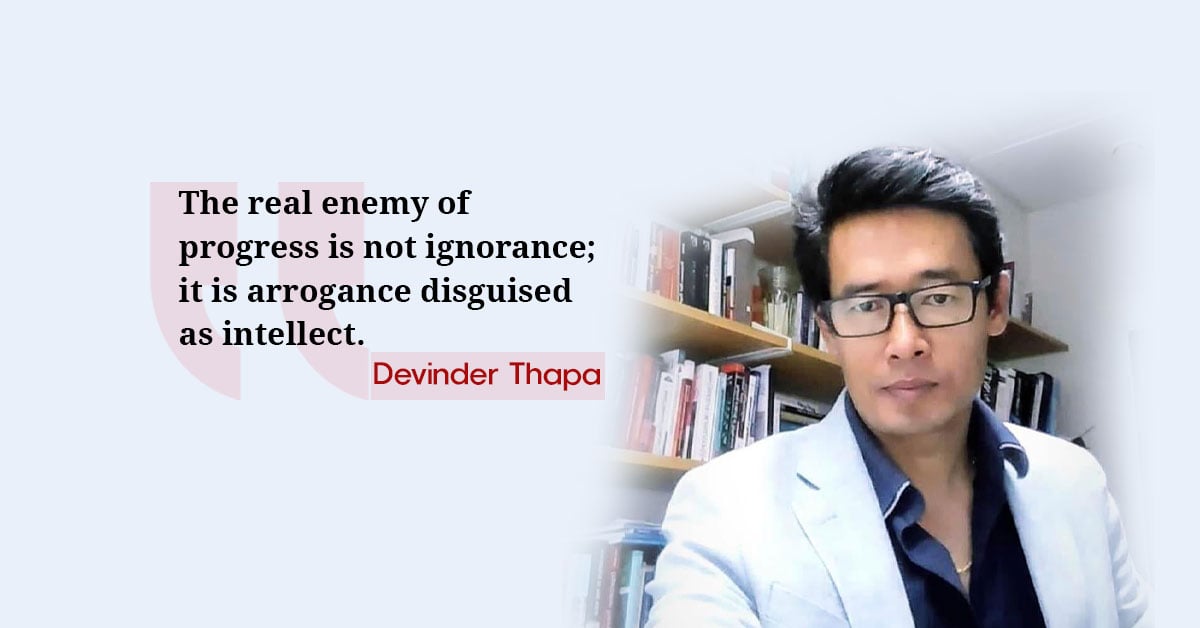

KATHMANDU: In the last few months, Nepal has witnessed something both inspiring and unsettling. The young generation, especially Gen Z, finally stood up against the old order that had ruled and ruined the country for four decades.
The movement was raw, emotional, and full of contradictions, but it carried a rare sense of honesty, a moral awakening long missing from our politics. For a moment, it felt like history was breathing again. Yet as soon as this energy began to challenge the status quo, the so-called educated class, the commentators, the experts, the habitual critics, started to reveal what I call the great failure of the educated mind.
These are the people who never miss a chance to criticize but rarely dare to create. For years, they shouted about how the system was broken, how leaders were corrupt, and how the people were blind. But when the people finally stood up, they couldn’t stand the change.
Suddenly, they found new targets: the very youths who dared to take the risk. They began spinning arguments that the interim government was full of “foreign agents” or “INGO puppets.” Overnight, the old political actors who had been discredited somehow reappeared, now claiming they were actually with the “real” Gen Z. And instead of challenging this manipulation, many of our so-called intellectuals became echo chambers of confusion.
The tragedy here is not just political; it is intellectual and moral. Our education system has produced people who can argue endlessly but rarely think deeply. It has trained us to memorize, to quote, to sound smart, not to reason honestly. Many of our educated elites use language not to enlighten but to manipulate. They twist words to sound profound, but behind the performance there is little truth.
Their language may be polished, but their thoughts are borrowed. They take pride in being neutral critics, standing above politics, yet that neutrality often hides a fear of commitment. It is easy to criticize any government that comes to power. It is fashionable to sound disillusioned. But real courage lies in building, in suggesting alternatives, in taking responsibility for ideas.
What frustrates me most is this habit of endless arguments without purpose. You see it all over social media, people competing to appear the most skeptical, the most rational, the most detached. But skepticism without sincerity becomes cynicism, and cynicism destroys the very possibility of hope.
These pseudo-intellectuals are quick to detect flaws in every initiative but never lift a finger to improve it. They will tell you that every new leader is compromised, that every movement is manipulated, that every dream is naive.
And yet, they offer no vision of their own. Maybe that’s because vision requires humility, patience, and a willingness to be proven wrong, qualities that our education never rewarded. The Gen Z movement, for all its immaturity, at least carries honesty. They are confused, yes. They argue among themselves, yes. But that confusion is part of growing up politically.
When a generation that has been excluded from decision-making suddenly finds itself in charge, mistakes are inevitable. That doesn’t mean their intentions are corrupt. It means they are learning in public. Instead of guiding them with constructive criticism, our intellectual class seems intent on demoralizing them. They throw around big words like “foreign intervention,” “global narrative,” or “agenda setting,” as if that alone proves wisdom. But what it really shows is laziness, a refusal to engage with reality as it is.
We don’t need more people who can deconstruct; we need people who can reconstruct. It’s not the West’s fault, or anyone else’s. The problem is our own habit of mistaking cleverness for intelligence, and noise for thought. When I look at the debates now, I see less of a clash of ideas and more of a contest for attention.
Everyone wants to win the argument; no one wants to solve the problem. And the result is paralysis. The country feels stuck, not because we lack energy or talent, but because our minds are cluttered with self importance and borrowed rhetoric.
The tragedy of Nepal’s so-called educated class is that they think knowledge automatically equals wisdom. It doesn’t. Wisdom comes from moral clarity, from knowing when to stand, when to listen, and when to build. In this chaotic transition, we need fewer critics and more creators. We need voices that question without belittling, that critique without killing hope.
The real enemy of progress is not ignorance; it is arrogance disguised as intellect. I still believe this generation can learn, can evolve, can build something better. But for that to happen, the educated among us must first unlearn their pride and rediscover the courage to think honestly. Until then, our biggest challenge won’t be corruption or politics, it will be the noise of those who talk without meaning what they say.